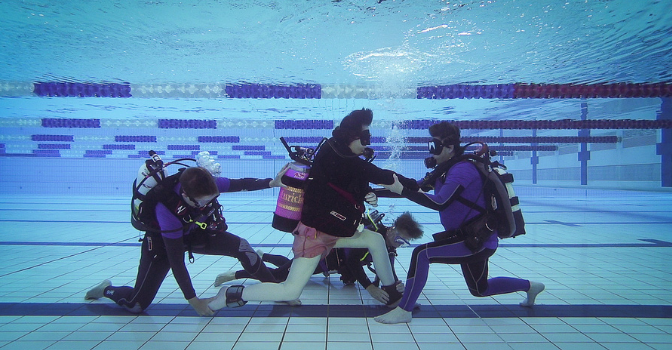An innovative program is using the weightless environment of deep water to help people with disabilities to become more mobile, feel better and achieve their goals.
The Scuba Gym on the NSW Central Coast enables people to use scuba equipment so they can participate in therapy based exercises in a pool up to four metres deep.
Trainer and qualified scuba diving instructor Lyndi Leggett says she was inspired to start The Scuba Gym in Australia after seeing the success founder David Lawrence had with participants in the US.
When David’s son was paralysed from the neck down at the age of 11, he created a scuba therapy based workout that helped to rewire his son’s nervous system. Over time, David junior was able to walk again. Together they founded The Scuba Gym in Florida.
David’s techniques, developed over 10 years working with people with neuro special needs and disabilities, have helped many people to improve muscle tone, reduce pain and spasms, and become more mobile.
After spending time training with David, Lyndi launched the program in Australia two years ago and is already achieving some incredible results.
Who can it help?
Scuba therapy may be able to assist people with:
- Quadriplegia or paraplegia
- Multiple sclerosis
- Dandy Walker syndrome
- Cerebral palsy
- Spina bifida
- Down syndrome
- And more.

The benefits of scuba therapy.
The benefits are individual to each participant and are life changing,” Lyndi said.
“For people who are in a chair all day, being underwater relaxes the muscles so they can move in a way they are unable to move out of the water. The nerves in the legs and feet are stimulated. They’re working on the core and balance. A lot goes on under the water.”
Being submerged can also be therapeutic for people with autism or sensory processing challenges because the underwater environment filters out all outside noise, creating a sense of peace and calm which can continue well after leaving the water.

Confidence and better quality of life.
“I believe that if you feel better you are better. Whatever the science is, I feel better and it’s a great feeling. There’s no cure for MS but it doesn’t stop me, it doesn’t stop anybody from having a better quality of life. I can be a little bit better than I was this morning. It has given me a lot of hope.”
Lincoln, a quadriplegic, tried scuba therapy once and was immediately hooked.
“After I completed my session and I was back in my wheelchair, I noticed my body was feeling better than it had in years. I felt strong and confident, like my mind was in tune with everything right down to my fingers and toes, and continued to be for days afterwards,” he said.
Keen to give scuba therapy a go?
For more information check out https://thescubagym.com.
Get more stories from the Leap in! Crew.
Take a look at the news section on our updated website for more great stories, NDIS updates and more. We also have a range of ebooks, checklists and valuable resources.
If you’d like to get in touch with our experienced team, call 1300 05 78 78, email crew@leapin.com.au or use the live chat feature on our website.
Further Reading
Getting back to nature with garden therapy.
21 diverse therapy options for kids.

